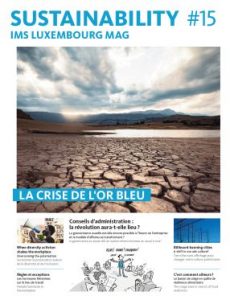When Activism Shakes Up the Corporate Sphere
Diversity has activist roots and at the same time, it was created as a positive, constructive addition to social and political equality movements. SustainabilityMag#15 explains how to manage the dynamics created by #metoo or BlackLivesMatter.
Looking at the General Shareholder Meetings of BP or Engie tells us: Polarisation is not a special interest discussion in D&I but a central issue of Corporate Governance. How to acknowledge and eventually incorporate new expectations from customers, employees, candidates, shareholders or other stakeholders? And what if these expectations would lead to a fundamental change of the business model, the governance or the daily people and leadership processes?
Three Activist Movements that made it into the business world
The current 15th edition of ‘Sustainability IMS Luxembourg Mag’ devotes an entire section to current Diversity dynamics and how to handle them. It starts by describing three major societal movements that have had huge impacts on companies.
The more recent and probably most prominent movements are #metoo and #blacklivesmatter (BLM) which have both required large companies – and big brands in particular – to position themselves in relation to gender and racial biases and discrimination at large and sexual harassment and systemic racism in particular.
The Stonewall riots are also included as sexual minority topics have recently become prominent at football events, court rulings and before these unfortunately through suicides and killings as well (#loveislove).
Beyond these Diversity movements a significant level of activism has been developing in societies and politics over the past ten years. The campaigns from climate to covid and basic income share one characteristic: They tend to polarise and so does D&I (today) in most business organisations.
How to Overcome Polarisation and Unity your Company behind DE&I
In a detailed analysis, SustainabilityMag#15 unpacks the various developments of D&I activism and how it overlaps with generational differences. It describes the specific mechanisms of societal campaigning in social media contexts, and what the effects on the business world we often see.
The article shows how an intrinsic approach to DE&I can both unite stakeholders and add value to the organisational agenda at the same time. One key success factor is to understand the specifics of the given company, e.g., related to the corporate culture, the industry context or the maturity.
As a big difference to activist demands, the article emphasises the need to strive for continuous improvement rather than disruptive revolution.
Two practical tools
SustainabilityMag#15 describes two specific offers of the IMS Sustainability Academy which both help to develop an intrinsic approach to DE&I. One is to work with senior leadership teams to assist them in creating their specific business case and road-map for DE&I – as an addition to the high-level Global Corporate rationale. The second focuses on CXOs and how to support them individually in identifying their personal access to DE&I and their individual credo as it relates to their business role.
DE&I as a factor to create sustainable organisations
While polarisation and populism show their toxic effects in societies, companies have a huge opportunity to create an integrative DE&I approach that connects business needs, employee expectations and management challenges in a constructive way. This re-engineered approach not only adapts the socio-political ideas of DE&I to the corporate sphere, it also generates tangible value for the business, its leaders and all employees.
Read the English article ou en francais – first published in

